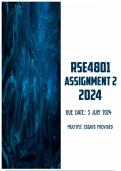, PLEASE USE THIS DOCUMENT AS A GUIDE TO ANSWER YOUR ASSIGNMENT
Please note that the author of this document will not responsibility for any plagiarizing you
commit.
You are an educational researcher who wants to investigate learner apathy/alienation. An important
part of research is to gain clarity on your paradigmatic beliefs and assumptions. For this research
project you consider the interpretative and critical paradigms. Research paradigms consist of basic
beliefs about issues such as the relation with the research participants, the purpose of the research, the
nature of reality and of knowledge. This assignment provides you with the opportunity to investigate
how these paradigms assist you to articulate your beliefs about research.
Write an academic essay that includes the following:
Background on the problem of learner apathy/alienation (400 words);
A problem statement (100 words);
An explanation how the problem will be investigated drawing on an interpretative
paradigm. This includes the following:
Main elements of an interpretative paradigm (400 words);
The purpose of the research project (200 words);
How you will engage with the research participants (200 words).
How are theories used? (100 words)
An explanation of how the problem will be investigated drawing on a critical research
paradigm. This includes the following:
Main elements of a critical research paradigm (300 words);
The purpose of the research project (200 words).
How you will engage with the research participants (200 words)
How are theories used? (100 words)
A justification of the paradigm you prefer to work with (300 words).
Essay 1
Learner apathy and alienation are pervasive issues in the educational landscape, significantly
affecting students' academic performance and overall well-being. Apathy is characterized by a lack
of interest, enthusiasm, or concern for school activities, leading to minimal participation and effort in
academic tasks. Alienation, on the other hand, refers to a sense of estrangement or disconnection
from the educational environment. Together, these phenomena result in students feeling disengaged,
undervalued, and often, misunderstood.
Several factors contribute to the rise of apathy and alienation among learners. One of the primary
causes is the mismatch between the educational content and students' interests or life experiences.
When the curriculum fails to resonate with students' real-world experiences or future aspirations, it
becomes difficult for them to see the relevance of their education, leading to disengagement.
Additionally, traditional teaching methods that emphasize rote learning and standardized testing over
creative and critical thinking further exacerbate feelings of apathy. These methods often do not cater
to diverse learning styles, leaving many students feeling bored or frustrated.
, Socio-economic factors also play a crucial role in learner apathy and alienation. Students from
disadvantaged backgrounds often face additional challenges such as lack of access to resources,
inadequate support systems, and external pressures such as financial instability or family
responsibilities. These challenges can lead to a sense of hopelessness and disengagement from the
educational process. Moreover, the school environment itself, including the quality of
teacher-student relationships and peer interactions, significantly impacts student engagement.
Positive, supportive relationships can enhance students' sense of belonging and motivation, whereas
negative interactions can lead to increased feelings of alienation.
The implications of learner apathy and alienation are profound and far-reaching. Academically,
disengaged students are more likely to exhibit poor performance, higher absenteeism, and increased
dropout rates. The emotional and psychological effects are equally concerning, with apathetic or
alienated students often experiencing low self-esteem, increased anxiety, and a diminished sense of
belonging. These outcomes not only affect their current educational experience but also their future
prospects, limiting their opportunities for higher education and employment.
Addressing the problem of learner apathy and alienation requires a multifaceted approach that
considers the individual, social, and systemic factors at play. Educators and policymakers need to
develop strategies that create a more inclusive and engaging learning environment. This can include
incorporating culturally relevant pedagogy, promoting active and experiential learning methods, and
providing adequate support systems for all students. Additionally, fostering positive relationships
within the school community and ensuring that students feel valued and heard can significantly
mitigate feelings of alienation.
Problem Statement
Learner apathy and alienation are critical issues in education that lead to disengagement, low
academic performance, and emotional distress among students. These phenomena manifest as a lack
of interest and a sense of disconnection from the educational environment. Addressing this problem
requires an in-depth understanding of the underlying causes and effective strategies to foster student
engagement and well-being. By investigating learner apathy and alienation through interpretative
and critical paradigms, this research aims to uncover the personal, social, and systemic factors
contributing to these issues and to propose interventions that enhance educational experiences for all
students.
Investigating Learner Apathy/Alienation Through an Interpretative Paradigm
Main Elements of an Interpretative Paradigm
The interpretative paradigm is grounded in the belief that reality is socially constructed and
subjective. It emphasizes understanding the meaning and experiences of individuals from their own
perspectives, making it particularly suitable for exploring complex phenomena like learner apathy
and alienation.
The main elements of this paradigm include:
Epistemology: In the interpretative paradigm, knowledge is viewed as subjective and
context-dependent. Researchers seek to understand the world through the lived experiences and
meanings that individuals assign to their actions and interactions. This contrasts with positivist
approaches that emphasize objective, measurable phenomena.




